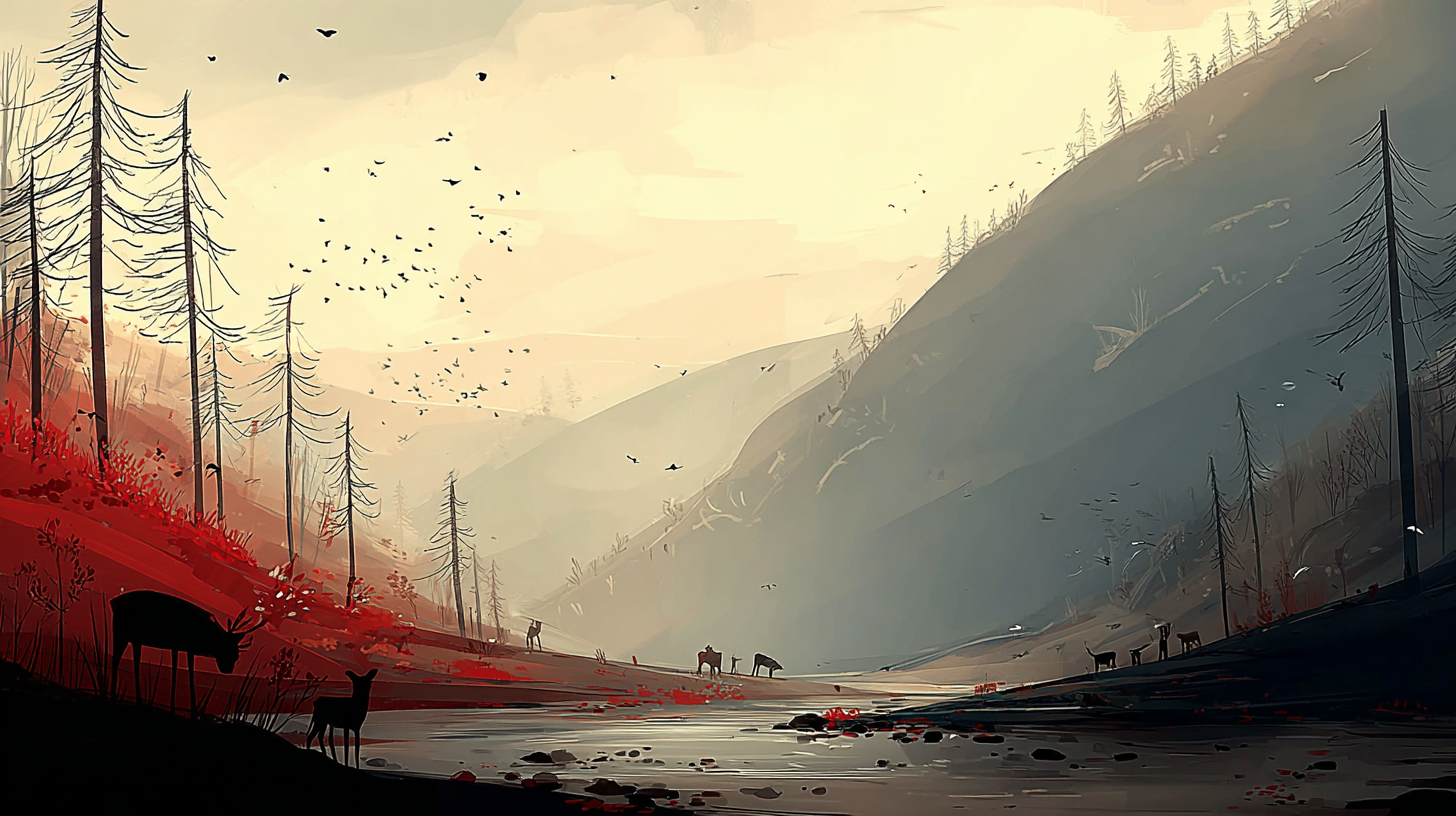Nature means the world of forests, animals, and things not made by people, or a person’s basic character.
自然とは、山や森、動物など人が作っていない世界のこと。または、人や物のもともとの性質のこと。
以下は英単語 “nature” に関するストーリー型学習コンテンツです。まずは大枠の意味を理解して最後の文章で確認しましょう。
主な意味(main meaning)
| 品詞 | 意味 | 発音記号 | 英語例文 |
|---|---|---|---|
| 名詞 | 自然(森・山・動物などを含む) | /ˈneɪ.tʃɚ/ | We should protect nature for future generations. |
| 名詞 | 本質、性質、特徴 | /ˈneɪ.tʃɚ/ | It’s in his nature to help others. |
語源(etymology)
ラテン語「natura(生まれつきの状態、生まれ)」から。
核となるイメージは「生まれたままのもの」「作られていないもの」。
類義語(synonyms)
| 類義語 | 英語例文 |
|---|---|
| environment | We must care for the environment to live healthily. |
| wilderness | She loves to go hiking in the wilderness. |
| character | His quiet character made him a good listener. |
| essence | The essence of the story is about kindness. |
| landscape | The landscape of this area is breathtaking. |
反義語(antonyms)
| 反義語 | 英語例文 |
|---|---|
| city | Many people move from the countryside to the city. |
| artificiality | Some people prefer artificiality over the rawness of nature. |
コロケーション(collocations)
| コロケーション | 英語例文 |
|---|---|
| protect nature | We need to protect nature from pollution. |
| be close to nature | Living in a cabin lets you be close to nature. |
| nature reserve | The nature reserve is home to many rare animals. |
| nature lover | My sister is a true nature lover. |
| laws of nature | Gravity is one of the laws of nature. |
2項表現(binomials)
| 表現 | 英語例文 |
|---|---|
| nature and nurture | The debate between nature and nurture is ongoing. |
| peace and nature | She found peace and nature in the countryside. |
英語ストーリー(english story)
Title: A Job Close to Nature
Sana always dreamed of working in a place surrounded by nature. She didn’t like the noisy city and preferred the calmness of the mountains. After graduating from university, she got a job as a tour guide at a nature reserve.
Every day, she walked through the wilderness, explaining the beauty of the plants and animals to visitors. One day, a young boy asked her, “Why is nature so important?” She smiled and said, “Nature gives us clean air, water, and food. It also helps us feel peaceful.”
Some visitors were nature lovers, while others came from big cities and were surprised by the simple beauty of the forest. Sana always said, “It’s in our nature to enjoy the outdoors. We must protect nature so future generations can experience it too.”
Sana often discussed the difference between nature and nurture with her coworkers. They agreed that while people have their own character, their environment also plays a big role.
Though her job wasn’t easy, she felt it was her essence to share the wonders of the forest. Every evening, watching the sunset, she felt lucky. Living and working close to nature gave her peace and nature in her heart.
和訳
タイトル:自然に近い仕事
サナはいつも**自然(nature)に囲まれた場所で働くのが夢だった。騒がしい都会(city)が苦手で、山の静けさの方が好きだった。大学を卒業したあと、彼女は自然保護区(nature reserve)**でツアーガイドの仕事に就いた。
毎日、彼女は**自然のままの場所(wilderness)**を歩きながら、植物や動物の美しさを訪問者に説明した。ある日、ひとりの少年が「なぜ自然って大切なの?」と聞いた。彼女はほほえんでこう答えた。「自然は私たちにきれいな空気、水、食べ物をくれるの。それに、心を落ち着けてくれるよ。」
訪問者の中には**自然愛好家(nature lovers)もいたが、大都市から来た人たちは森のシンプルな美しさに驚いていた。サナはいつもこう言った。「外で過ごすことを楽しむのは私たちの本質(nature)**なの。未来の人たちのためにも、**自然を守らないと(protect nature)**ね。」
サナは同僚とよく「生まれつきと育ち(nature and nurture)」の違いについて話した。人にはそれぞれの**性格(character)**があるが、環境も大きな影響を与えるという点で意見が一致していた。
仕事は簡単ではなかったが、森のすばらしさを伝えることが彼女の**本質(essence)だと感じていた。毎晩、夕日を見ながら、彼女は幸せを感じた。自然に近い生活と仕事が、彼女の心にやすらぎと自然(peace and nature)**を与えてくれていた。
Q&A
「nature」と「environment」の違いは?
「nature(自然)」は人の手が入っていない森・山・動物など、ありのままの自然を指します。一方で「environment(環境)」は自然も含みますが、人の住む場所や社会環境も含めたもっと広い意味です。例:「学校の環境」「職場の環境」などにも使えます。
「nature」と「wilderness」の違いは?
「wilderness(荒野・手つかずの自然)」は、特に人が住んでいない野生の地域を指します。「nature」はもっと広く、花や川、公園のような場所も含みますが、「wilderness」はより厳しく野生的な場所をイメージします。
「nature」と「character」の違いは?
「character(性格・人柄)」は人の性格や行動パターンに焦点を当てた言葉です。「nature」も「その人の性質」という意味がありますが、より生まれ持った本質的な部分に使われます。たとえば「It’s in his nature to be kind.」は「彼の生まれつきの性格」になります。
「nature」と「essence」の違いは?
「essence(本質)」は、物事や考えの中心的・最も大事な要素を意味します。「nature」も「本質」という意味がありますが、より自然さや人間の性格に焦点を当てたときに使います。「essence」は抽象的・哲学的な話題にも使われやすいです。
「nature」と「landscape」の違いは?
「landscape(風景)」は見た目としての地形や景色を指します。「自然の景色」であっても、「landscape」は視覚的な要素が中心です。一方「nature」は存在そのもの、命や生態系も含んだ意味になります。
「nature」と「city」の違いは?
「city(都市)」は人が多く住む場所で、ビルや車など人工物が中心です。これは「nature(自然)」と反対の環境を表す単語で、自然が少ない場所のことです。
「nature」と「artificiality」の違いは?
「artificiality(人工的なもの・不自然さ)」は、人が作ったり、自然でないものを指します。「nature」はその逆で、何も手が加えられていない自然なものや状態を意味します。
「protect nature」と「be close to nature」の違いは?
「protect nature(自然を守る)」は自然を汚さないように行動することを指します。ゴミを拾ったり、森林を守る活動などです。「be close to nature(自然と近い生活をする)」は、自然の中で過ごしたり、自然を身近に感じる暮らしをすることです。
「nature reserve」と「nature」の違いは?
「nature reserve(自然保護区)」は、動植物を守るために保護された特定の地域を指します。「nature」はその中にある自然そのものを指します。
「nature lover」と「nature」の違いは?
「nature lover(自然好きな人)」は、自然を見るのが好きだったり、自然の中で過ごすことを楽しむ人を指します。「nature」はその対象である自然そのものです。
「laws of nature」と「nature」の違いは?
「laws of nature(自然の法則)」は、重力や気温の変化など自然界で起こる決まりのようなものです。「nature」はその法則が起きている世界全体を指します。
「nature and nurture」と「nature」の違いは?
「nature and nurture(生まれと育ち)」は、人の性格や行動が「遺伝(nature)」と「育てられ方(nurture)」のどちらから来るのかという考え方です。「nature」単体では「生まれ持った性質」を意味します。
「peace and nature」と「nature」の違いは?
「peace and nature(平和と自然)」は、心が落ち着く静かな環境と自然の両方を合わせて表現した言い方です。「nature」はその一部であり、心を穏やかにしてくれる存在です。



コメント